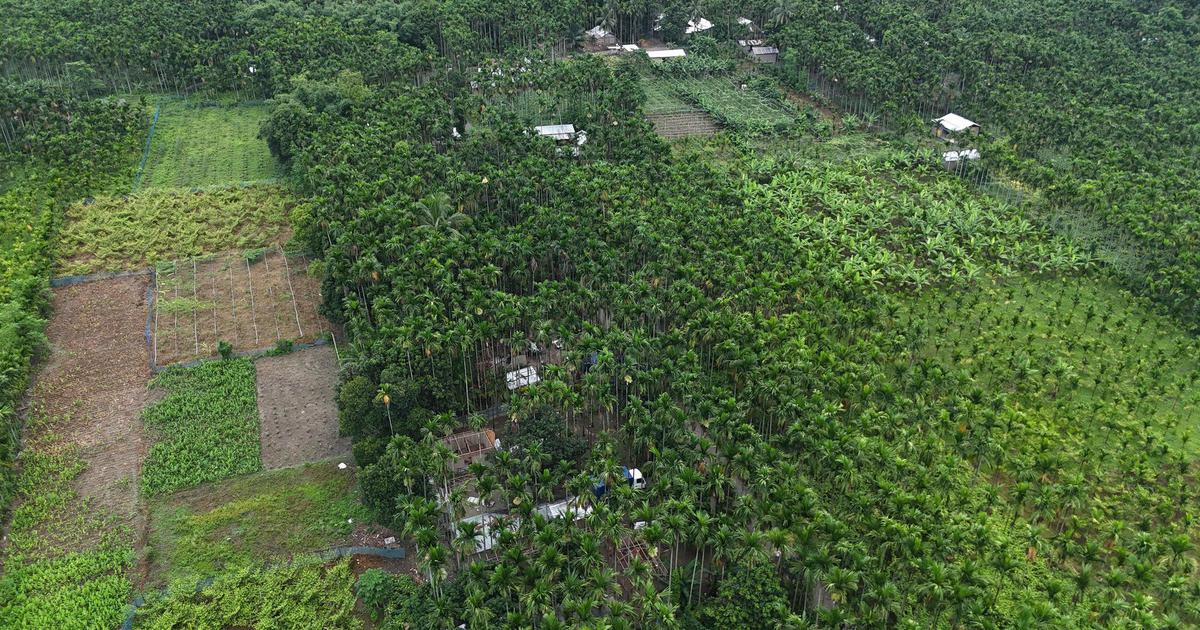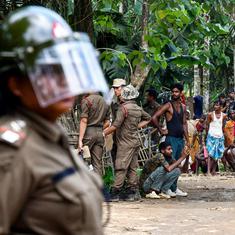Assam: Evicted residents claim government had helped them settle in disputed area in 1970s
About 1,500 Muslim families are being displaced in an eviction drive in Golaghat launched to clear alleged encroachments on forest land.

Residents displaced by an eviction drive launched by the Assam government on Tuesday in the Golaghat district claimed that the government itself had helped them settle in the area over 40 years ago to prevent alleged encroachment from Nagaland, the Morung Express reported on Wednesday.
The Assam government launched the eviction drive in the Golaghat district on Tuesday morning to clear alleged encroachments on more than 3,600 acres of forest land in the Rengma Reserve Forest. Nearly 1,500 Muslim families are likely to be displaced by the drive.
Residents who were evicted on Tuesday from the Bidyapur village in Golaghat claimed that the settlement was established under the patronage of the Assam government in the late 1970s in a contested area on the state’s border with Nagaland, called the disputed area belt.
Both states have questioned each other’s claims on the disputed area belt for more than 60 years.
One of the displaced residents in Bidyapur told the Morung Express: “We are branded illegal settlers today, but my parents were settled here by the Assam government when [Janata Party leader] Golap Borbora was Chief Minister [1978–79].”
Ali Kazi, who was among those who received eviction notices, said that the villagers were brought to the area in the 1980s to protect the forest land from “encroachment” by Nagaland, The New Indian Express reported.
“Where will we go from here?” Kazi asked. “My father had come from Nagaon district around 40 years ago, but I was born here.”
Kazi also stated that the residents had requested the administration to settle them at an alternative place, but they refused, The New Indian Express reported.
Another resident, Akbar Ali, accused the state government of selective targeting during the drive, reported The Assam Tribune.
“We have lived here for 40 years,” Ali was quoted as saying. “There are Bodo, Assamese, Hindu, and Muslim people here, but the authorities seem to focus only on us. If the government wants to evict us, they should at least offer us a place to go.”
However, Golap Borbora’s son Pankaj Borbora said that under his father’s government, land distribution had taken place in Doyang, not the Uriamghat area where the evictions are currently taking place. “And it was done for indigenous, landless communities who had been struggling for land rights for decades,” he said in a Facebook post.
The state government has claimed that the area being cleared was an illegal settlement.
“Around 2,000 families are living in those areas,” PTI quoted an unidentified official as saying. “Out of them, notices were served to about 1,500 families, who illegally settled here. The remaining families are forest dwellers and have certificates from the Forest Rights Committee.”
Those whose homes are being demolished belong to the Muslim community, while those who have certificates from the Forest Rights Committee are from Bodo, Nepali, Manipuri and other communities, the official added.
HCM Dr @himantabiswa visited Uriamghat in Golaghat district to inspect sites identified for eviction of encroached govt land.
— Chief Minister Assam (@CMOfficeAssam) July 25, 2025
HCM stated that eviction of VGR, PGR, Satra & forest land will continue in phases. pic.twitter.com/T8Lol9oroO
Earlier this month, 15 residents of the Golaghat district challenged eviction notices sent to them on July 21 and July 24 before the Gauhati High Court. In response to the petitions, the High Court on Tuesday granted them time till August 7 to vacate the land.
This is the sixth eviction carried out in Assam since June 16.
On June 16, Goalpara district authorities demolished the homes of 690 families, all of them belonging to Bengali-origin Muslims, who were living on an allegedly encroached land in the Hasila Beel, a wetland.
The families told Scroll that many of them were living in the area before it was declared a wetland.
On July 3, around 220 families were evicted during an anti-encroachment drive in upper Assam’s Lakhimpur district. The district authorities said the families were living on 77 acres of land at four locations, including three Village Grazing Reserves.
Dhubri District Magistrate Dibakar Nath told Scroll on July 8 that the administration had demolished the homes of 1,400 Muslim families of Bengali origin from nearly 1,157 acres of government land to make way for a power project.
On July 12, authorities in Goalpara cleared 140 hectares of land in the Paikan Reserve Forest, displacing 1,080 families, most of whom are Muslims of Bengali origin.
Between 2016 and August 2024, more than 10,620 families – the majority of them Muslim – were evicted from government land, according to data provided by the state revenue and disaster management department.
Also read: India’s bulldozer demolitions are being fuelled by political silence









